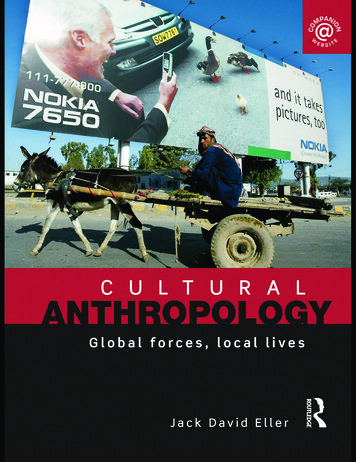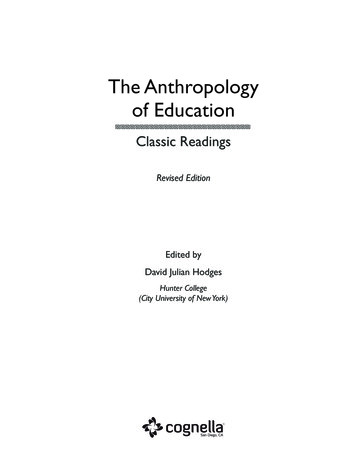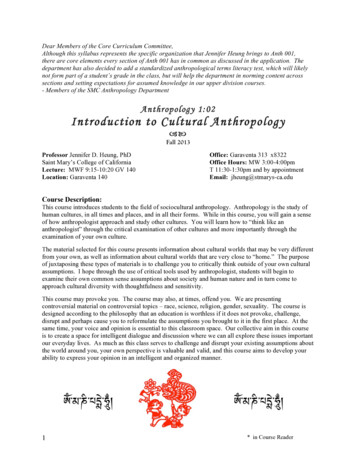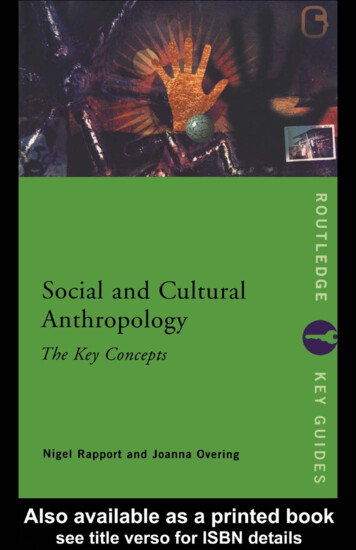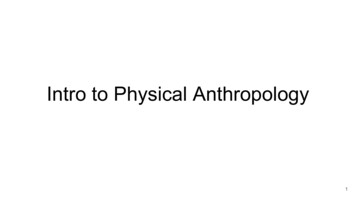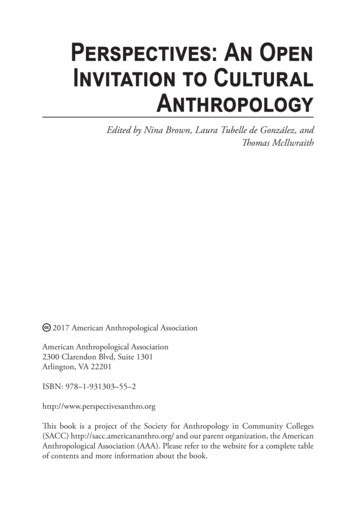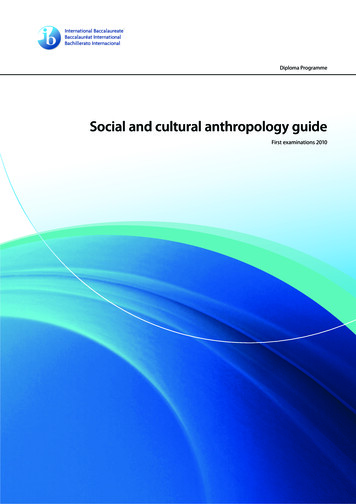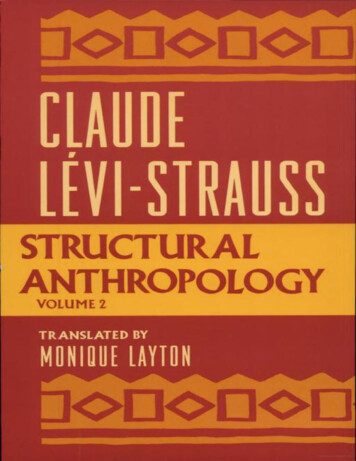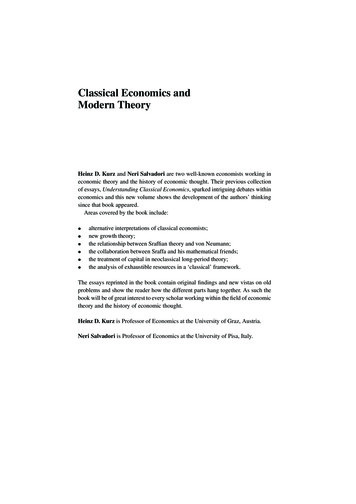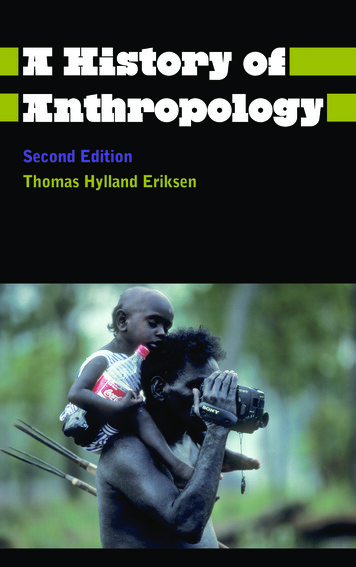
Transcription
A History of AnthropologyEriksen HOA3 00 pre 116/04/2013 16:04
Anthropology, Culture and SocietySeries Editors:Professor Vered Amit, Concordia UniversityandDr Jon P. Mitchell, University of SussexPublished titles include:Claiming Individuality:The Cultural Politics ofDistinctionEdited by Vered Amit andNoel DyckDiscordant Development:Global Capitalism and theStruggle for Connection inBangladeshKaty GardnerThe Aid Effect:Giving and Governing inInternational DevelopmentEdited by David Mosse andDavid LewisCommunity, Cosmopolitanismand the Problem of HumanCommonalityVered Amit andNigel RapportAnthropology, Developmentand the Post-ModernChallengeKaty Gardner andDavid LewisCultivating Development:An Ethnography of Aid Policyand PracticeDavid MosseHome Spaces, Street Styles:Contesting Power and Identityin a South African CityLeslie J. BankBorder Watch:Cultures of Immigration,Detention and ControlAlexandra HallIn Foreign Fields:The Politics and Experiencesof Transnational SportMigrationThomas F. CarterCorruption:Anthropological PerspectivesEdited by Dieter Haller andCris ShoreContesting PublicsFeminism, Activism,EthnographyLynne Phillips and Sally ColeTerror and Violence:Imagination and theUnimaginableEdited by Andrew Strathern,Pamela J. Stewart andNeil L. WhiteheadOn the Game:Women and Sex WorkSophie DayAnthropology’s World:Life in a Twenty-First CenturyDisciplineUlf HannerzSlave of Allah:Zacarias Moussaoui vs theUSAKatherine C. DonahueHumans and Other AnimalsCross-cultural Perspectives onHuman–Animal InteractionsSamantha HurnRace and Ethnicity in LatinAmericaSecond EditionPeter WadeA World of Insecurity:Anthropological Perspectiveson Human SecurityEdited by Thomas Eriksen,Ellen Bal and Oscar SaleminkCulture and Well-Being:Anthropological Approachesto Freedom and PoliticalEthicsEdited by Alberto CorsínJiménezRace and Sex in Latin AmericaPeter WadeA History of AnthropologyThomas Hylland Eriksen andFinn Sivert NielsenEthnicity and Nationalism:Anthropological PerspectivesThird EditionThomas Hylland EriksenGlobalisation:Studies in AnthropologyEdited by Thomas HyllandEriksenSmall Places, Large Issues:An Introduction to Social andCultural AnthropologyThird EditionThomas Hylland EriksenWhat Is Anthropology?Thomas Hylland EriksenEriksen HOA3 00 pre 2State Formation:Anthropological PerspectivesEdited by Christian KrohnHansen and Knut G. NustadCultures of Fear:A Critical ReaderEdited by Uli Linke andDanielle Taana SmithFair Trade and a GlobalCommodity:Coffee in Costa RicaPeter LuetchfordAnthropology, Art andCultural ProductionMaruška SvašekThe Capability of Places:Methods for ModellingCommunity Response toIntrusion and ChangeSandra WallmanAnthropology at the Dawn ofthe Cold War:The Influence of Foundations,McCarthyism and the CIAEdited by Dustin M. WaxLearning Politics fromSivaram:The Life and Death of aRevolutionary Tamil Journalistin Sri LankaMark P. WhitakerThe Will of the Many:How the AlterglobalisationMovement is Changing theFace of DemocracyMarianne Maeckelbergh16/04/2013 16:04
A History of AnthropologySecond EditionThomas Hylland Eriksen and Finn Sivert NielsenEriksen HOA3 00 pre 316/04/2013 16:04
First published 2001 by Pluto Press. Second edition published 2013345 Archway Road, London N6 5AAwww.plutobooks.comDistributed in the United States of America exclusively byPalgrave Macmillan, a division of St. Martin’s Press LLC,175 Fifth Avenue, New York, NY 10010Copyright Thomas Hylland Eriksen and Finn Sivert Nielsen 2001, 2013The right of Thomas Hylland Eriksen and Finn Sivert Nielsen to be identifiedas the authors of this work has been asserted by them in accordance with theCopyright, Designs and Patents Act 1988.British Library Cataloguing in Publication DataA catalogue record for this book is available from the British LibraryISBN 978 0 7453 3353 3 HardbackISBN 978 0 7453 3352 6 PaperbackISBN 978 1 8496 4918 6 PDF eBookISBN 978 1 8496 4920 9 Kindle eBookISBN 978 1 8496 4919 3 EPUB eBookLibrary of Congress Cataloging in Publication Data applied forThis book is printed on paper suitable for recycling and made from fully managedand sustained forest sources. Logging, pulping and manufacturing processes areexpected to conform to the environmental standards of the country of origin.10987654321Typeset from disk by Stanford DTP Services, Northampton, EnglandSimultaneously printed digitally by CPI Antony Rowe, Chippenham, UK andEdwards Bros in the United States of AmericaEriksen HOA3 00 pre 416/04/2013 16:04
ContentsSeries Preface viiPreface to the Second Edition viiiPreface to the First Edition ix1. Proto-Anthropology 1Herodotus and other Greeks 1; After Antiquity 3;The European conquests and their impact 6; Why all this is notquite anthropology yet 10; The Enlightenment 11; Romanticism 152. Victorians, Germans and a Frenchman 20Evolutionism and cultural history 21; Morgan 23; Marx 25;Bastian and the German tradition 27; Tylor and otherVictorians 29; The Golden Bough and the Torres expedition 32;German diffusionism 35; The new sociology 38; Durkheim 39;Weber 413. Four Founding Fathers 46The founding fathers and their projects 49; Malinowski amongthe Trobriand Islanders 52; Radcliffe-Brown and the ‘naturalscience of society’ 55; Boas and historical particularism 58; Maussand the total social prestation 61; Anthropology in 1930: parallelsand divergences 644. Expansion and Institutionalisation 68A marginal discipline? 69; Oxford and the LSE, Columbia andChicago 72; The Dakar-Djibouti expedition 74; Culture andpersonality 77; Cultural history 80; Ethnolinguistics 82;The Chicago school 83; ‘Kinshipology’ 86; Functionalism’slast stand 90; Some British outsiders 925. Forms of Change 96Neo-evolutionism and cultural ecology 99; Formalism andsubstantivism 104; The Manchester school 107; Methodologicalindividualists at Cambridge 112; Role analysis and systemtheory 1176. The Power of Symbols 120From function to meaning 121; Ethnoscience and symbolicanthropology 125; Geertz and Schneider 127; Lévi-Straussand structuralism 130; Early impact 133; The state of the artin 1968 135Eriksen HOA3 00 pre 516/04/2013 16:04
vi A History of Anthropology7. Questioning Authority 138The return of Marx 139; Structural Marxism 141; The not-quiteMarxists 145; Political economy and the capitalist world system 147;Feminism and the birth of reflexive fieldwork 151; Ethnicity 155;Practice theory 158; The sociobiology debate and Samoa 1618. The End of Modernism? 166The end of modernism? 171; The postcolonial world 176;A new departure or a return to Boas? 179; Other positions 1849. Global Networks 192Towards an international anthropology? 194; Trends for thefuture 200; Biology and culture 203; Globalisation and theproduction of locality 211Bibliography 221Index 239Eriksen HOA3 00 pre 616/04/2013 16:04
Series PrefaceAnthropology is a discipline based upon in-depth ethnographicworks that deal with wider theoretical issues in the context ofparticular, local conditions – to paraphrase an important volumefrom the series: large issues explored in small places. This serieshas a particular mission: to publish work that moves away froman old-style descriptive ethnography that is strongly area-studiesoriented, and offer genuine theoretical arguments that are of interestto a much wider readership, but which are nevertheless located andgrounded in solid ethnographic research. If anthropology is to argueitself a place in the contemporary intellectual world, then it mustsurely be through such research.We start from the question: ‘What can this ethnographic materialtell us about the bigger theoretical issues that concern the socialsciences?’ rather than ‘What can these theoretical ideas tell us aboutthe ethnographic context?’ Put this way round, such work becomesabout large issues, set in a (relatively) small place, rather thandetailed description of a small place for its own sake. As CliffordGeertz once said, ‘Anthropologists don’t study villages; they studyin villages.’By place, we mean not only geographical locale, but also othertypes of ‘place’ – within political, economic, religious or othersocial systems. We therefore publish work based on ethnographywithin political and religious movements, occupational or classgroups, among youth, development agencies, and nationalistmovements; but also work that is more thematically based – onkinship, landscape, the state, violence, corruption, the self. Theseries publishes four kinds of volume: ethnographic monographs;comparative texts; edited collections; and shorter, polemical essays.We publish work from all traditions of anthropology, andall parts of the world, which combines theoretical debate withempirical evidence to demonstrate anthropology’s unique positionin contemporary scholarship and the contemporary world.Professor Vered AmitDr Jon P. MitchellviiEriksen HOA3 00 pre 716/04/2013 16:04
Preface to the Second EditionIt would not be correct to claim that anthropology has changeddramatically in the twelve years that have passed since thepublication of the first edition of this book. However, there areseveral reasons why we felt that a thorough revision and updatewas in order by now.First, the non-metropolitan anthropologies – from Brazil toRussia, from Japan to India – were treated cursorily and somewhatsuperficially in the first edition. This has now, at least to the best ofour abilities, been rectified. Recent scholarship on ‘other people’santhropologies’ has been of great help here.Second, there were a number of small errors, inaccuraciesand ambiguities scattered around in the first edition. We cannotguarantee that they are all gone, but again, we have done our best.Third, there have in fact been some slight changes or adjustmentsin the course that anthropology has been taking in the last few years.For example, the field of globalisation studies, an incipient andslightly naughty trend in the 1990s – naughty because it eschewedan assumed orthodoxy seeing anthropology as the study of small,fairly isolated societies – has grown into maturity. Few anthropologists today see problems in studying the relationship between theglobal and the local, and most do, in one way or another.Fourth, as a matter of fact, the early chapters have been revisedand modified just as much as the latter ones. Indeed it may be saidthat the remote past has changed just as rapidly as the recent past.Partly we see the past in a different light because of recent changes;partly new research and a deepened understanding reveals newdetails and formerly ignored patterns.It is not true, in other words, that the past is safe and immuneto change since what has happened has happened. As anthropologists interested in history have shown time and again, the past issomething malleable and dynamic. Each generation has its ownpast. This is our anthropological past.Thomas Hylland EriksenFinn Sivert NielsenOslo, November 2012viiiEriksen HOA3 00 pre 816/04/2013 16:04
Preface to the First EditionThis is an ambitious book, but not a pretentious one. It is ambitiousin that it tries, within the space of relatively few pages, to make senseof the diverse history of anthropology. Our priorities, omissionsand interpretations are bound to be contested, since there can beno single authoritative history of anything, least of all a sprawling,dynamic and disputed field like anthropology. Still, the book isunpretentious, since our aim throughout has been to offer a soberand balanced account of the historical growth of anthro pology asa discipline, not to propose a radical re-interpretation of it.There exists a growing scholarly literature on the history ofanthropology, which this textbook does not try to compete with.Nevertheless, we know of no existing book with exactly the samescope as this one. The scholarly literature is often specialised, andexisting textbooks on anthropological history are either moretheoretically oriented or more committed to one or a few professionaltraditions. Although we may not always have succeeded, we havestrived to give an impression of the parallel, convergent andinterdependent developments of all major traditions in social andcultural anthropology.The book is chronologically ordered. Beginning with the ‘protoanthropologies’ from ancient Greece to the Enlightenment, itcontinues with the creation of academic anthropology and thegrowth of classical sociology during the nineteenth century. Thethird chapter concentrates on the four men who, by generalconsensus, are considered the founding fathers of twentieth-centuryanthropology, and the fourth chapter indicates how their work wascontinued, and diversified, by their students. The fifth and sixthchapters both deal with the same period – from about 1946 to about1968, but concentrate on different trends: Chapter 5 discusses thetheoretical controversies surrounding concepts of society and socialintegration, while Chapter 6 covers concepts of culture and symbolicmeaning. In Chapter 7, the intellectual and political upheavals ofthe 1960s and 1970s are presented, with emphasis on the impulsesemanating from Marxism and feminism. Chapter 8 deals withthe 1980s, concentrating on the postmodernist movement and itsclose cousin, postcolonialism, two critical trends, which seriouslyixEriksen HOA3 00 pre 916/04/2013 16:04
x A History of Anthropologychallenged the discipline’s self-confidence; while the ninth and finalchapter presents a few of the major post-postmodern trends thatemerged during the 1990s.We do not consider the history of anthropology to be a lineartale of progress. Some ‘modern’ controversies, for example, haveoccupied scholars since the Enlightenment and even earlier. At thesame time, we believe that there has been a steady, cumulativegrowth in knowledge and understanding within the subject, notleast with regard to method. Moreover, as anthropology respondsto changes in the outside world, its substantial focus changesaccordingly. Thus, the movement from the early industrial andcolonial age to the information age of global modernities has ledthe subject through a series of transformations, yet essentially itcontinues to raise the same questions that were asked 50, 100 oreven 200 years ago.Oslo/Copenhagen, July 2001THE & FSNEriksen HOA3 00 pre 1016/04/2013 16:04
1Proto-AnthropologyHow long have anthropologists existed? Opinions are dividedon this issue. The answer depends on what you mean by ananthropologist. People around the world have always been curiousabout their neighbours and more remote people. They have gossipedabout them, fought them, married them and told stories aboutthem. Some of their stories were written down. Some were latercriticised as inaccurate or ethnocentric (or flatly racist). Some storieswere compared with others, about other people, leading to generalassumptions about ‘people elsewhere’, and what humans everywherehave in common. In this broad sense, we start an anthropologicalenquiry the moment a foreigner moves into the neighbouring flat.If we restrict ourselves to anthropology as a scientific discipline,some would trace its roots back to the European Enlightenmentduring the eighteenth century; others would claim that anthropologydid not arise as a science until the 1850s, others again wouldargue that anthropological research in its present-day sense onlycommenced after the First World War. Nor can we avoid suchambiguities.It is beyond doubt, however, that anthropology, considered as thescience of humanity, originated in the region we commonly refer toas ‘the West’, notably in four ‘Western’ countries: France, Britain,the USA and Germany. Historically speaking, this is a Europeandiscipline, and its practitioners, like those of all European sciences,occasionally like to trace its roots back to the ancient Greeks.HERODOTUS AND OTHER GREEKSThanks to research carried out by anthropologists, historians andarchaeologists, we today believe that ‘the ancient Greeks’ differedquite radically from ourselves. In the classical city-states, more thanhalf the population were slaves; free citizens regarded manual labouras degrading, and democracy (which was also ‘invented’ by theGreeks) was probably more similar to the competitive potlatchfeasts of the Kwakiutl (Chapter 4), than to the institutions describedin modern constitutions (Finley 1973; P. Anderson 1974).1Eriksen HOA3 01 text 116/04/2013 16:04
2 A History of AnthropologyGoing back to the Greeks is thus a long journey, and we peer intotheir world through cracked and smoky glass. We catch glimpses oflittle city-states surrounded by traditional Iron Age farmland wherefamily and kinship formed the main social units, connected to theoutside world through a network of maritime trade relationshipsbetween urban settlements along the Mediterranean and Black Seacoasts. The trade in luxury goods and the free labour entailed byslavery brought considerable wealth to the cities, and the citizens ofthe polis, with their distaste for manual work, had at their disposala large surplus, which they used, among other things, to wage war,and to build temples, stadiums, baths and other public buildings,where male citizens could meet and engage in philosophical disputesand speculations about how the world was put together.It was in such a community that Herodotus of Halicarnassus(c. 484–425 bce) lived. Born in a Greek colonial town on thesouth-west coast of present-day Turkey, Herodotus began to travelas a young man and gained personal knowledge of the many foreignpeoples that the Greeks maintained contacts with. Today, Herodotusis mainly remembered for his history of the Persian Wars (Herodotus1982), but he also wrote detailed travel narratives from various partsof western Asia and Egypt, and (based on second-hand information)from as far away as the land of the Scythians on the northern coastof the Black Sea, the Ethiopians, and the peoples of the Indus valley.In these narratives, far removed as they are from our present world,we recognise a problem that has pursued anthropology, in variousguises, up to this day: how should we relate to ‘the Others’? Arethey basically like ourselves, or basically different? Most, if not all,anthropological theory has tried to strike a balance between thesepositions, and this is what Herodotus did too. Sometimes he is aprejudiced and ethnocentric ‘civilised man’, who disdains everythingforeign. At other times he acknowledges that different peoples havedifferent values because they live under different circumstances,not because they are morally deficient. Herodotus’ descriptionsof language, dress, political and judicial institutions, crafts andeconomics are highly readable today. Although he sometimesclearly got the facts wrong, he was a meticulous scholar, whosebooks are often the only written sources we have about peoples ofa distant past.Many Greeks tested their wits against a philosophical paradoxthat touches directly on the problem of how we should relate to‘the Others’. This is the paradox of universalism versus relativism.A present-day universalist would try to identify commonalities andEriksen HOA3 01 text 216/04/2013 16:04
Proto-Anthropology3similarities (or even universals) between different societies, whilea relativist would emphasise the uniqueness and particularity ofeach society or culture. The Sophists of Athens are sometimesdescribed as the first philosophical relativists in the Europeantradition (several almost contemporary thinkers in Asia, such asGautama Buddha, Confucius and Lao-Tze, were concerned withsimilar questions). In Plato’s (427–347 bce) dialogues Protagorasand Gorgias, Socrates argues with the Sophists. We may picturethem in dignified intellectual battle, surrounded by colourful templesand solemn public buildings, with their slaves scarcely visible in theshadows between the columns. Other citizens stand as spectators,while Socrates’ faith in a universal reason, capable of ascertaininguniversal truths, is confronted by the relativist view that truth willalways vary with experience and what we would today call culture.Plato’s dialogues do not deal directly with cultural differences.But they bear witness to the fact that cross-cultural encounterswere part of everyday life in the city-states. The Greek trade routesstretched from the Straits of Gibraltar to present-day Ukraine, theyfought wars with Persians and many other ‘barbarians’. The veryterm ‘barbarian’ is Greek and means ‘foreigner’. To a Greek earit sounded as if these aliens were only able to make unintelligiblenoises, which sounded like ‘bar-bar, bar-bar’. Similarly, in Russian,Germans are to this day called nemtsy (the mute ones): those whospeak, but say nothing.Aristotle (384–322 bce) also indulged in sophisticated speculationsabout the nature of humanity. In his philosophical anthropology hediscusses the differences between humans in general and animals,and concludes that although humans have several needs in commonwith animals, only man possesses reason, wisdom and morality.He also argued that humans are fundamentally social by nature. Inanthropology and elsewhere, such a universalistic style of thought,which seeks to establish similarities rather than differences betweengroups of people, plays a prominent role to this day. Furthermore,it seems clear that anthropology has vacillated up through historybetween a universalistic and a relativistic stance, and that centralfigures in the discipline are also often said to lean either towardsone position or the other.AFTER ANTIQUITYIn the classical Greek city-state, conditions were perhaps particularlyfavourable for the development of systematic science. But in theEriksen HOA3 01 text 316/04/2013 16:04
4 A History of Anthropologyensuing centuries as well, ‘civilised’ activities such as art, science andphilosophy were cultivated all around the Mediterranean: first, inthe Hellenistic period, after the Macedonian, Alexander the Great(356–323 bce) had led his armies to the northern reaches of India,spreading Greek urban culture wherever he went; then later, duringthe several centuries when Rome dominated most of Europe, theMiddle East and North Africa, and impressed on its population aculture deriving from Greek ideals. In this complex, multinationalsociety, it is not surprising to find that the Greek interest in ‘theOther’ was also carried on. Thus, the geographer Strabo (c. 63–64bce–c. ce 21) wrote several voluminous tomes about strange peoplesand distant places, which sparkle with curiosity and the joy ofdiscovery. But when Christianity was established as state religionand the Roman Empire started falling apart in the mid-fourthcentury ce, a fundamental change took place in European culturallife. Gone were the affluent citizens of the cities of Antiquity, whocould indulge in science and philosophy, thanks to their income fromtrade and slave labour. Gone, indeed, was the entire city culture,the very glue that held the Roman Empire together as an (albeitloosely) integrated state. In its place, countless local Europeanpeoples manifested themselves, carriers of Germanic, Slavic,Finno-Ugric and Celtic traditions that were as ancient as thoseof pre-urban Greece. Politically, Europe fell apart into hundredsof chiefdoms, cities and autonomous local enclaves, which wereonly integrated into larger units with the growth of the modernstate, from the sixteenth century onwards. Throughout this longperiod, what tied the continent together was largely the Church,the last lingering trustee of Roman universalism. Under the aegisof the Church, international networks of monks and clergymenarose and flourished, connecting the pockets of learning in whichthe philosophical and scientific traditions of Antiquity survived.Europeans like to see themselves as linear descendants of Antiquity,but throughout the Middle Ages, Europe was an economic, politicaland scientific periphery. Following the rise of Islam in the seventhcentury, the Arabs conquered territories from Spain to India and,for at least the next seven centuries, the economic, political andintellectual centres of the Mediterranean world lay in sophisticatedmetropolises such as Baghdad and Cordoba, not in the ruins ofRome or Athens, nor in glorified villages such as London or Paris.The greatest historian and social philosopher of this period was IbnKhaldun (1332–1406), who lived in present-day Tunisia. Khaldunwrote, among other things, a massive history of the Arabs andEriksen HOA3 01 text 416/04/2013 16:04
Proto-Anthropology5Berbers, furnished with a long, critical introduction on his use ofsources. He developed one of the first non-religious social theories,and anticipated Émile Durkheim’s ideas about social solidarity(Chapter 2), which are today considered a cornerstone of sociologyand anthropology. In line with Durkheim and the first anthropologists who utilised his theories, Khaldun stresses the importance ofkinship and religion in creating and maintaining a sense of solidarityand mutual commitment among the members of a group. His theoryof the difference between pastoral nomads and city-states may, withthe wisdom of hindsight, be said to have been centuries ahead ofits time.A contemporary of Khaldun, Ibn Battuta (1304–1369), was inhis way just as significant for the history of anthropology. Not amajor social theorist, Battuta is considered to be the most widelytravelled person of the pre-industrial world. Born in Tangier inpresent-day Morocco, Battuta’s travels brought him as far east asChina and as far south as present-day Tanzania. Battuta’s mainwork, the Rihla (‘Travels’), was completed in 1355. Although laterscholars doubt the authenticity of some of the journeys described inthe book, it is considered a major source of knowledge about theworld known to the Arabs at the time, and of prevailing interpretations of other cultures.In spite of the cultural hegemony of the Arab world, there are afew European writings from the late medieval period, which maybe considered precursors of latter-day anthropology. Most famousis Marco Polo’s (1254–1323) account of his expedition to China,where he allegedly spent 17 years. Another example is the greatjourney through Asia described in The Voyage and Travels of SirJohn Mandeville, Knight, compiled by an unknown author in thefourteenth century. Both books stimulated the European interest inalien peoples and customs, although the reliability of their accountsmust have been questioned already then (Launay 2010).Then, with the advent of mercantilist economies and the contemporaneous Renaissance in the sciences and arts, the small, but richEuropean cities of the late Middle Ages began to develop rapidly, andthe earliest signs of a capitalist class emerged. Fired by these greatsocial movements and financed by the new entrepreneurs, a series ofgrand exploratory sea voyages were launched by European rulers.These journeys – to Africa, Asia and America – are often described inthe West as the ‘Age of Discovery’, though the ‘discovered’ peoplesthemselves may have had reason to question their greatness (seeWolf 1982).Eriksen HOA3 01 text 516/04/2013 16:04
6 A History of Anthropologythe EUROPEAN CONQUESTS and their impactThe ‘Age of Discovery’ was of crucial importance for laterdevelopments in Europe and the world, and – on a lesser scale– for the development of anthropology. From the PortugueseKing Henry the Navigator’s exploration of the West coast ofAfrica in the early fifteenth century, via Columbus’ five journeysto America (1492–1506), to Magellan’s circumnavigation of theglobe (1519–22), the travels of this period fed the imaginations ofEuropeans with vivid descriptions of places whose very existencethey had been unaware of. These travelogues, moreover, reachedwide audiences, since the printing press, invented in the mid-fifteenthcentury, soon made books a common and relatively inexpensivecommodity all over Europe.Many of the early travelogues from the New World were fullof factual errors and saturated with Christian piety and culturalprejudices. A famous example is the work of the merchant andexplorer Amerigo Vespucci, whose letters describing his voyages tothe continent that still bears his name were widely circulated at thetime. His writings were reprinted and translated, but his descriptionsof the Native Americans (who were called Indios, Indians, sinceColumbus believed he had found a route to India), reveal a muchless scrupulous attitude to facts than in Herodotus’ or Khaldun’swritings. Occasionally, Vespucci seems to use the Native Americansas a mere literary illustration, to underpin the statements he makesabout his own society. Native Americans are, as a rule, representedas distorted or, frequently, inverted reflections of Europeans: theyare godless, promiscuous, naked, have no authority or laws; they areeven cannibals! Against this background, Vespucci argues effectivelyfor the virtues of absolutist monarchy and papal power, but hisethnographic descriptions are virtually useless as clues to nativelife at the time of the Conquest.There were contemporaries of Vespucci, such as the FrenchHuguenot Jean de Léry and the Spanish clergyman Bartolomé delas Casas, who gave more truthful and even sympathetic accounts ofNative American life, and such books also sold well. But then, themarket for adventure stories from distant climes seems to have beeninsatiable in Europe at this time. In most of the books, a more or lessexplicit contrast is drawn between the Others (who are either ‘noblesavages’ or ‘barbarians’) and the existing order in Europe (whichis either challenged or defended). As we shall see in later chapters,the legacy of these early, morally ambiguous accounts still weighsEriksen HOA3 01 text 616/04/2013 16:04
Proto-Anthropology7on contemporary anthropology, and to this day, anthropologistsare often accused of distorting the reality of the peoples they writeabout – in the colonies, in the Third World, among ethnic minoritiesor in marginal areas. And, a
Anthropology, Art and Cultural Production mAruškA sVAšEk Race and Ethnicity in Latin America Second Edition pEtEr wAdE Race and Sex in Latin America pEtEr wAdE The Capability of Places: Methods for Modelling Community Response to Intrusion and Change sAndrA wAllmAn Anthropology at t
